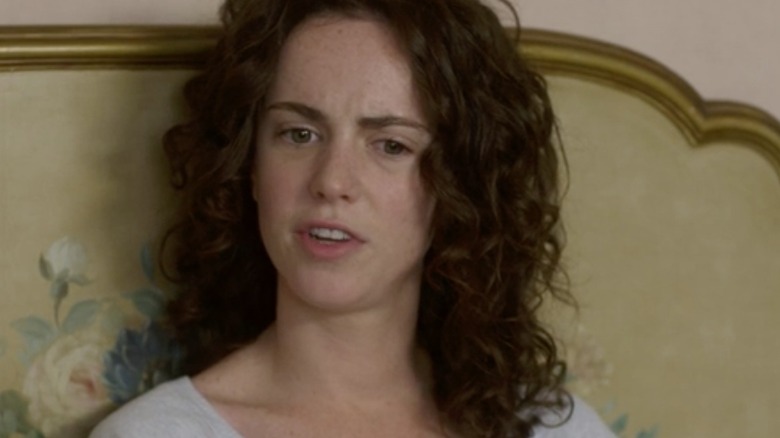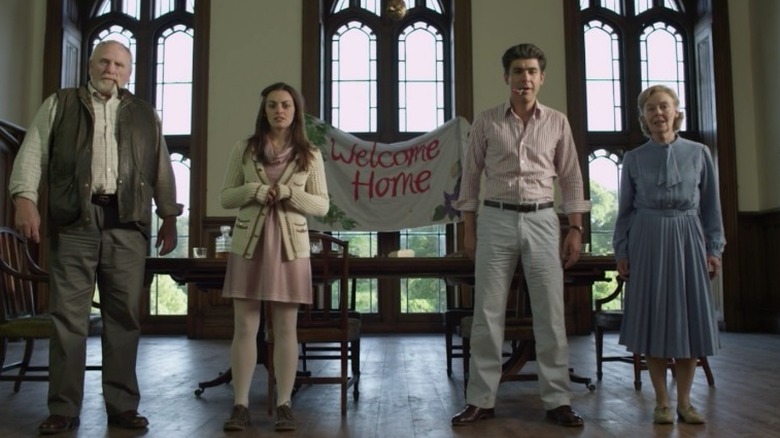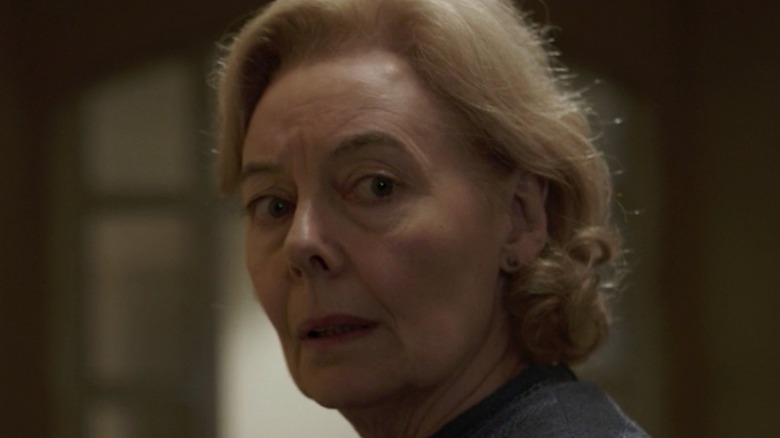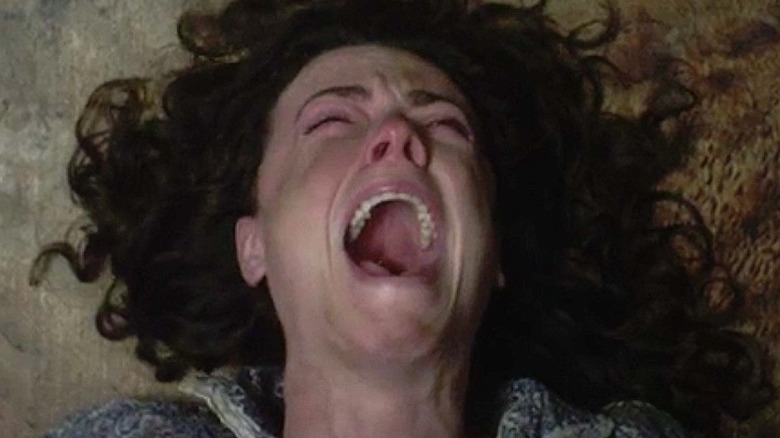The Ending Of Estranged Explained
Written by Simon Fantauzzo and William Borthwick, produced by Steven Schneider ("Insidious"), and directed by "Population Zero's" Adam Levins (via the Los Angeles Times), 2015's "Estranged" blends the unsettling unreliability of memory with the suffocating isolation and terror of feeling unsafe and trapped in one's own home. The film's double-twist ending, though, adds some surprising (perhaps even excessive) seasoning to this scary stir-fry in the form of some good old fashioned class warfare.
The film's on-paper premise is relatively simple, and horrifying enough in its own way. After suffering a near-fatal accident that leaves her partially (though not permanently) paralyzed and erases her memory prior to the event, a woman named January, or "Jan" (Amy Manson), returns to the childhood home she left behind years prior for reasons she can't, in her post-accident state, remember. Accompanied by her boyfriend Callum (Simon Quarterman), Jan struggles to relate to a mother, father, sister, and brother who feel like strangers to her, a struggle made all the more unsettling by the fact that the family appears to be frozen in time in approximately the late 1940s, while the grandeur of the enormous house in which they live with their butler Thomas (Craig Conway) has all but disintegrated into ruin. Jan remembers flashes of her childhood (a woman wandering into the woods with a shotgun, a scared little girl watching from the stairs), but little more, and as the complex plot unravels, she learns the terrifying truth that compelled her to escape the formerly grandiose home the first time around.
Estranged starts off on one foot, but lands on another
Jan's domineering and blatantly misogynistic father Albert (James Cosmo) gets rid of her boyfriend and ally Callum pretty quickly, and she finds herself alone and isolated in the middle of nowhere surrounded by a group of gas-lighting weirdos. Her sister Kathrine (Nora-Jane Noone, of "The Descent") buries her jealousy for Jan under a veneer of creepy, childlike affection, while her supposed brother Laurence (James Lance) runs around with a tranquilizer gun pretending to be a professional veterinarian, and attempts to get Jan to give him a blowjob when she begins to suspect these people aren't really her family. Her mother Marilyn (Eileen Nicholas) does genuinely appear to love Jan, but is so under-the-thumb of her controlling husband that she goes along with whatever he says. When Jan finds proof — in the form of some suspicious photographs — that she was someone else's child, the beaten-down butler Thomas slips her an article revealing that the real Mrs. Victoria Dunfield (her mother, she thinks) committed suicide when Jan was just a young girl.
When Jan attempts a failed escape from her mysterious, run-down manor house prison, (and when it's revealed that the people now living in the home were actually the Dunfield's former servants), Albert rapes, imprisons, and impregnates Jan (presumably, to ensure her status as their actual relative) all with the support — which ranges from passive to active — of his wife and two children. Jan is held captive, and repeatedly raped, beaten and tortured, until Thomas works up the courage to help her escape. And here's where the second twist in "Estranged" comes in.
Estranged fools audiences along with its protagonist
Up until Thomas' explanation of the events that unfolded prior to Jan's escape years earlier, the audience is led to believe that Jan's real parents — the wealthy owners of the estate — are dead, and the home taken over by disgruntled servants hell-bent on holding on to their stolen life by convincing Jan that it was theirs along, and that her real parents never existed. Of course, that doesn't explain why the family dresses and behaves as though WWII has literally just come to an end, except perhaps that it's their understanding of how "proper wealthy folk" behave, but it does conveniently imbue Jan's confusion with a layer of unnerving displacement that adds to her suspicion.
After Thomas kills Kathrine, breaks the pregnant Jan free from her ale cellar prison, and provides her with a shotgun, he explains that Marylin is, in fact, her real mother. As it turns out, Jan's wealthy father was a genuine monster, who raped Marylin and stole her child to raise as his own. Unable to live with the guilt, Lady Dunfield took her own life, and when the young Jan learned the truth of her lineage, she ran away from home. This doesn't explain why she never told anyone what happened — not the police, nor her boyfriend Callum — but it does (again, conveniently) allow the film to add another thematic layer to what appeared to be a fairly straightforward narrative concerned with the horror of being gaslit and isolated.
Estranged's double twists weave more than one theme together
By having Jan's real mother be the impoverished and powerless victim of rape and oppression, the film attempts to explore both the cyclical terror of injustice, and the ways in which insularity (whether brought on by wealth or poverty) can cause otherwise rational people to behave in truly horrific ways. Marylin allows her daughter to be gaslit, imprisoned, beaten, raped, and impregnated, all in an effort (or so she tells herself) to keep her family "together." On the flip side, Jan's real father felt justified in stealing a woman's child to save face, while his wife (for a handful of years, at least) was willing to raise that child as her own, also in an attempt to maintain the status quo.
In the end, Jan kills her fake father and her half brother, allows her mother Marylin to kill herself, and manages to escape. Interestingly, we never see Jan hop in a car with Thomas, the butler hero, and flee the property. Instead, the film concludes with the abused protagonist sitting on the front porch of the property in a blood-soaked nightgown, still trapped in her own broken, memory-less, and pregnant body. Presumably, this image is a visual reinforcement of a fear harbored by many: that is, that no matter what we do, no matter how far we run, and no matter how thoroughly we attempt to forget, the past is its own special kind of prison — one from which there is no actual means of escape.
If you or anyone you know has been a victim of sexual assault, help is available. Visit the Rape, Abuse & Incest National Network website or contact RAINN's National Helpline at 1-800-656-HOPE (4673).



